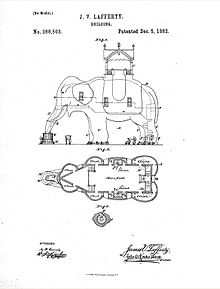Elephantine Colossus

The Elephantine Colossus, otherwise known as the Colossal Elephant or the Elephant Colossus, or by its function as the Elephant Hotel, was a tourist attraction located on Coney Island that was built in the shape of an elephant. An example of novelty architecture, the seven-story tall structure designed by James V. Lafferty stood above Surf Avenue and West 12th Street from 1885 until 1896, when it burnt down in a fire. During its lifespan, the thirty-one room building acted as a hotel, concert hall, and amusement bazaar.
It was the second of three elephants built by Lafferty, preceded by Atlantic City's Lucy the Elephant and followed by The Light of Asia in Cape May.
Size

At 150 feet tall, The Coney Island Elephant was over twice the size of Lucy the Elephant. Its legs were 18 feet in diameter, with the front legs serving as a cigar store while the back legs held the entrance, a circular stairway. Construction cost a quarter million dollars.[citation needed] Built two years before the Statue of Liberty, it was said to be the first artificial structure visible to immigrants arriving to the United States.[1]
Construction required 3,500,000 feet of lumber, 11,000 kegs of nails, 12 tons of iron bolts and 57,000 square feet of tin to cover the structure.[2]
Rooms and attractions
Originally intended to serve as a hotel, the elephant contained novelty stalls, a gallery, a grand hall, and a museum in what would be the elephant's left lung. The elephant's eyes contained telescopes and acted as an observatory for visitors. Its manager claimed to see, from the elephant's back, Yellowstone Park, Rio de Janeiro, and Paris.[3]
As Coney Island became more established as a center of tourism and leisure, the elephant began to serve as a brothel as well.[4] When the elephant caught fire on September 27th, 1896, it had not been used for several years.

Cover from October 10, 1896 issue of The Illustrated American
In popular culture
Baz Luhrmann's 2001 motion picture Moulin Rouge! features Nicole Kidman as a Parisian courtesan named Satine. Her boudoir is in a set replica of the famous Jardin de Paris Elephant, a giant pachydermoid structure inspired by Lafferty's elephantine works, built in 1889 in the garden cafe adjacent to the rear of the original Moulin Rouge and torn down prior to 1906 renovation of the cabaret hall.[5]
See also
- Lucy the Elephant, a similar surviving beach attraction elephant in Margate, New Jersey
References
- ^ QI E06 - Everything, Etc.
- ^ McMahon, William (1988). The Story of Lucy the Elephant. Margate, N.J.: Save Lucy Committee, Inc. p. 40.
- ^ CONEY ISLAND'S BIG ELEPHANT.; ITS BACK NEARLY TWO HUNDRED FEET ABOVE THE GROUND. NY Times, May 30, 1885
- ^ Immerso, Michael (2002 1, 2001). "Chapter 3: The Elephant Colosus". Coney Island: The People's Playground. Rutgers University Press. pp. 38–42. ISBN 0-8135-3138-1.
{{cite book}}: Check date values in:|date=(help) - ^ Moulin Rouge
External links
- Shapes of Time on Coney Island, with pictures of the Elephant Hotel.
